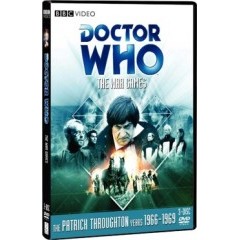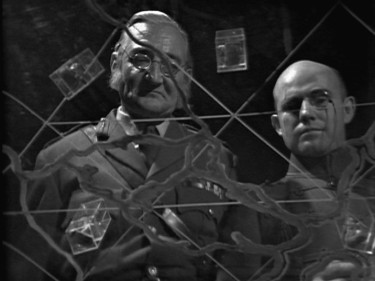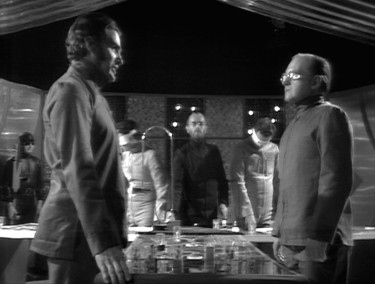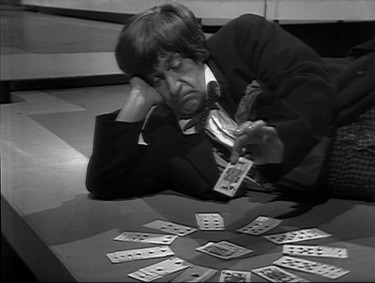The War Games

Released
- 6 July 2009 (UK)
- 3 November 2009 (US)
Rating
8/10
Review
The War Games is a brilliant, entertaining story with an intriguing plot, great writing, captivating characters, and fantastic development.
The War Games - 10 episodes
The War Games is true science fiction story with a captivating, innovative plot which nonetheless manages to be deliver great entertainment. The Doctor and his companions arrive on a World War I battlefield and soon end up among British folk. Of course, menacing external forces are at work and all is not quite as it seems. It soon becomes clear the the battlefield is being manipulated and controlled by hostile aliens who have set up similar situations for several other wars from human history. The remainder of the serial is devoted to unraveling the whole mystery about the aliens, who recevie fascinating expositon, a process which ends up revealing quite a lot about the origins and nature of the Doctor himself.
The War Games is a seial which combines the best elements of Doctor Who and then throws in something unique and unexpected. It features the dripping mystery of The Invasion, the anachronisms and manipulation of The Time Meddler, and the exuberant, manic acting of The Tomb of the Cybermen. At the same time, there is a fantastic mystery which is slowly peeled away, first about the very nature of the various battlefields, later about the hostile aliens and their plan, and finally about the Doctor. The historial setting of war and the story's anti-war message are new for Doctor Who, while the aliens are excellently relaized as a society (a rare achievement in Doctor Who), and their schemes are innovative and introduce a hard sci-fi element to the serial (also a rarity). Finally, the exploration of the Doctor and his background at the end of the serial makes The War Games a momentous and revelatory work.

The War Games is a success on pretty much every count. In terms of plot, the serial keeps the audience interested throughout while at the same time telling a complex, layered story. The slow exposition of the flawed nature of the situation works extremely well here, as it did in The Invasion, making early episodes quite successful. At the same time, there is an air of panic and unease running through the whole serial. Given that the serial is a whopping ten episodes long, some padding is to be expected, and some certainly does appear, but it's not particularly intrusive. Just as the war scenes become a bit tedious, the auidence is shown some of the inner workings of the aliens' headquarters complex, shifting the focus and allowing for a transition that maintins the interest of the audience. Here is where the story really shines, as the alien characters are very well-written, embodying distinct, well-realized personalities but at the same time demonstrating a society and a culture that is clear and unique.
The scenes involving the hostile aliens are some of the standout moments of the serial. The constant back-and-forth sniping between two of the aliens, the Security Chief and the War Chief, is thoroughly entertaining, while at the same time it serves the plot exposition well. The Doctor continually employs subterfuge in dealing with the aliens, and the games played between them are very satisfying to watch, much as they were in The Invasion. The fact that the aliens are all well-realized, complex characters also adds greatly to the story.
In addition to standout writing, the directing is spot-on. Director David Maloney's previous work in The Mind Robber demonstrated some talent for innovation in the stark early episodes, but was not absolutely stand out. Here, Maloney's work reaches the highs set by Michael Ferguson and Douglas Camfield. His direction has all the right flourishes: the use of motifs like glasses to demonstrate the aliens' control, long tracking shots to make the best use of the sets, well built-up introductions of important characters, unusual angles for shots at the aliens' headquarters, skilled employment of musical motifs, etc. The powerful, careful direction is a major asset to the serial.

as the War Lord looks on
The directing is supported by very high production values. The sets are many, each well-constructed and with a unique feel. The French chalet in the 1917 zone has an air of decadance and decay that provides the right aura for the action that occurs there. The alian headquarters is brilliantly constructed, with the interrogation room displaying a funky 60s pattern, while the War Room is reminiscent of the Dr. Strangelove room of the same name. In addition to the design successes, the music for the serial is also excellent. Composer Dudley Simpson provides a moody, ominous score laregly composed of repeating motifs which adds to the ambience of the story.
The acting, too, is largely exemplary. Guest heroes Lieutenant Carstaris and Lady Jennifer develop an instant rapport with the audience and serve the story very well, recalling the roles played by Ian and Barbara with the First Doctor. Early antagonist General Smythe is spot-on, a delicate mix of cold authoratian control and seething contempt, while the smug Von Weich also comes off very well.
The core of the guest actors comprises the alien antagonists. The Security Chief is a paranoid, frustrated, power-hungry man with an exceedingly strange voice and intonation. He sounds a bit like a Dalek, and he seems to make constant references to the impending arrival of "...the War Lord!". The Security Cheif does not get along well with his fellow alien villain, the War Chief. The War Chief is a classic villain: over-the-top, ridiculously self-assured, dramatic, and with a moustache to boot. Writer Terrance Dicks seems to think he takes it a bit too far, but actor Edward Brayshaw manages to offer just enough serious moments to make the character of the War Chief compelling and three-dimentional. Then there is the highly-anticipated War Lord, underplayed by Phillop Maddoc, but quite effecitve. On the whole, the guest actors are excellent.
The regulars, too, put in great performances. The Doctor exhibits all the best Second Doctor tendencies: he's incredulous in the face of injustice, exuberant when he must bluff his way though a situation, deceptive when protecting his companions, constant in the defense of righteousness, butpeevish and humourous throughout. Patrick Troughton hits all right notes: he's at intervals manic, humorous, and deadly serious. It's a wonderful performance that displays the best of the Second Doctor. Jamie and Zoe, too, do great work. Jamie succeeds in the role of the ever-faithful companion; his rapport with the Doctor is obvious. Zoe demonstrates extreme maturity is this episode; she's come a long way from the screaming girl in The Mind Robber or one-dimensional wunderkind of The Invasion. She's able to demonstrate leadership without coming across as bossy, and her work with the Doctor demonstrates the great mutual respect between them.

The greatest asset of The War Games is the mature, engrossing nature of the conflict at hand. Early Hartnell stories like The Daleks, The Azetcs, and The Resuce presented moral dilemmas that challeneged the Doctor and featured multi-dimensional villains, but sometimes suffered from pacing problems and a lack of action.. Troughton stories like Tomb of the Cybermen and The Seeds of Death featured entertaining action and adventeure, but sometimes lacked substance. The War Games combines the best elements of both of these approaches: the Doctor's interactions with the War Chief, the nuanced nature of the villains, and the lengths to which the Doctor must go to set things right as the story draws to a conclusion lend the story weight and meaning. At the same time, the story offers up enough action and variation to keep the audience engaged. The ability of the production staff to weave these two threads together is the greatest successs of The War GameS.
With all these great qualities, can anything negative be said about The War Games? The main problem is that the serial contains some extraneous elements that do not add anything to it. The most obvious criticism is the padding, which detracts from the quality of several episodes, especially episode 4. The presence of serveral war zones is unnecessary to the story; the Roman zone especially is a bit pathetic. There are some hokey sci-fi plot devices (e.g. "The Truth Machine"), while the serial also suffers from some plot discontinuities. For example, in episode 6, a group is supposed to go to the 1917 zone but ends up in the Civil War zone with no explanation. Also, the wierd glasses used by some at the alien headquarters are never explained. Another serious criticism is the writers' ignorance of history, which is especially problematic given the semi-historical nature of the serial. Terrance Dicks is off by about a century when talking about Wilberforce and the slave trade in the episode commentaries, and the lack of research leads to some strange inconsistencies, especially in the American Civil War Zone and the Roman Zone (British spies? The size of the Roman legion? Arturo "Villar"?). Another serious problem with the story is the role of the resistance leaders. They don't add as much to the story as the other guest characters (with the possible exception of Harper), and the acting is sometimes over-the-top ("Villar", again). The serial boasts opening credits which are unique, certainly a plus, but the credits could have been made a lot less abrasive. Also, the final episode, though significant and well-done, involved a great deal of absurd and unnecessary padding and running around in the first half, and the tone of the episode is completely different from that of the rest of the story. It comes off as a bit incongruous. Despite these nitpicks, the serial still boasts a strong foundation.
On the whole, The War Games is a riveting, captivating story with great acting, great production values, great directing, and an engrossing plot. It represents the best of Doctor Who.
8.3/10
Special features
The War Games has an abundance of speical features. The special feature "War Zone" is a "making of" feature which offers some insight into the production of the serial, featuting interviews with the director, writer, and producer. "Shades of Grey" is a look at the BBC's black-and-white era, while "Time Zones" offers historians a chance to assess the factual accuracy of the serial. There is also a feature discussing the concept and evolution of regeneration.
The epsidoe commentaries are sometimes informantive, as Dereck Sherwin and Terrance Dicks have some intereting insights to offer about the serial, and everybody recalls what is was like to work with Patrick Troughton. The commentaries are just informative enough to be worth listening to.